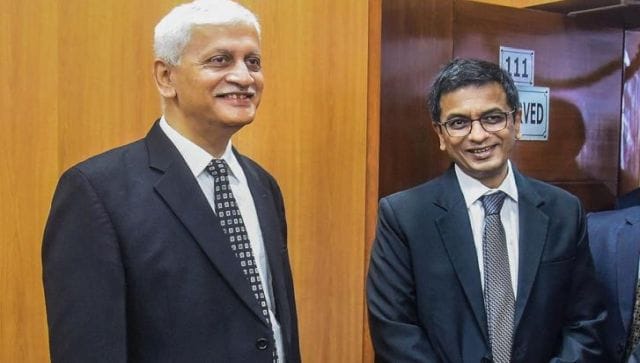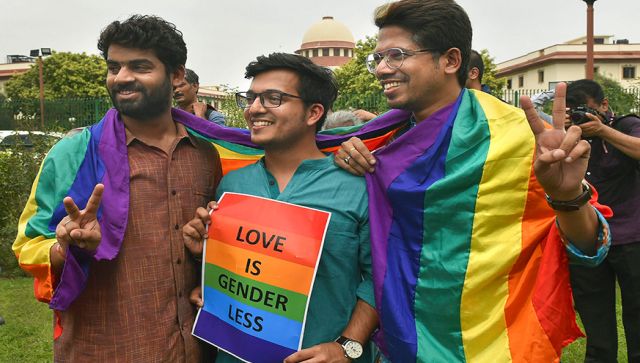Justice Dhananjaya Y Chandrachud has been sworn in as India’s 50th Chief Justice of India. He takes over as the head of the country’s judiciary from Justice UU Lalit, who demitted office on Tuesday after serving a short but hectic tenure of less than three months.
Dr Justice D.Y. Chandrachud sworn in as the Chief Justice of the Supreme Court of India at Rashtrapati Bhavan today. pic.twitter.com/8mXM6U55tL
— President of India (@rashtrapatibhvn) November 9, 2022
After taking his oath in the presence of President Droupadi Murmu, CJI DY Chandrachud paid tribute to the Mahatma Gandhi statue in the Supreme Court and was quoted as saying, “To serve the nation is my priority. We'll protect all the citizens of India, be it in terms of technology or registry reforms, or judicial reforms.”
Son of India’s longest-serving CJI
Born on 11 November 1959, Justice DY Chandrachud is the son of India’s longest-serving Chief Justice Yashwant Vishu Chandrachud. His mother Prabha was a classical musician.
He went to Mumbai’s Cathedral and John Connon School and then graduated from Delhi’s prestigious St Stephen’s College. He studied law at Delhi University and secured a master’s degree from Harvard Law School in the United States. He also completed a doctorate in judicial science from the institution.
At the age of 39, he was one of India’s youngest lawyers to be designated a senior advocate. In 1998, Justice Chandrachud has served as the Additional Solicitor General of India.
He was appointed a judge in 2000, even before he had turned 42. He was sworn in as the Chief Justice of the Allahabad High Court in 2013 and has been associated with the Bombay High Court where he served for 13 years. He was elevated as a judge in the Supreme Court in 2016.

The big verdicts, from Ayodhya to Sec 377
Since being elevated to the Supreme Court, the judge has been part of several benches which delivered landmark judgments. He was in the scheme of things for the setting up of a five-judge bench from its inception to hear the Ayodhya dispute. Then Chief Justice Ranjan Gogoi had handpicked only those who by seniority would go on to take up the top job.
Justice Chandrachud proactively involved himself during the Ayodhya hearing and put some searching questions to the counsel for both the Muslim and Hindu sides, according to a report by the news agency PTI.
Though CJI Gogoi read out the unanimous judgment, which cleared the way for the construction of the Ram Temple at the disputed site in Ayodhya, it did not carry the author’s name, breaking away from convention. However, from the judgment’s printed version – the use of distinct fonts and style – it was clear that the author was Justice Chandrachud, reports The Times of India.
Justice Chandrachud was part of the five-bench judge led by then CJI Dipak Misra that decriminalised Section 377 on 6 September 2018. During the first day of the hearing of petitions challenging the colonial era provision that criminalised same-sex relationships in July 2018, he said, “A person’s choice of a partner is a fundamental right, and it can include same-sex partner.”

He also wrote the lead judgment for the constitution bench in the Justice KS Puttaswamy versus the Union of India case, in which it was unanimously held that the right to privacy is a fundamental right under the Constitution.
The senior judge was also part of the bench which ordered that Section 497 of the Indian Penal Code that criminalised adultery was unconstitutional on the ground of being arbitrary, archaic, and violative of the right to equality and privacy.
In the Sabarimala case, Justice Chandrachud concurred with the majority verdict that the practice of prohibiting women of menstruating age from entering the Kerala temple was discriminatory and violated fundamental rights. He was also part of the crucial verdict which recognised “living will” made by terminally ill patients for passive euthanasia.
Notes of dissent
In October 2018, he delivered two powerful dissent notes in the Aadhaar case and the arrest of activists inciting the Bhima-Koregaon violence, placing personal liberty above the government’s power to curb fundamental rights for the larger public interest, reports ThePrint.
In his dissent, Justice Chandrachud declared that Aadhaar Act did not satisfy the standards for a money bill. He also said that the Act was unconstitutional on various counts.
While the Supreme Court verdict in a 2:1 judgment ruled that it would not set up a court-monitored investigation into the alleged role of five arrested activists in the caste violence that took place at Bhima Koregaon on 1 January 2018, Justice Chandrachud said that the court should establish a Special Investigation Team to look into the matter.

Overturning his father’s judgments
Interestingly, the stance taken by Justice Chandrachud on privacy and adultery was different from that of his father.
In 1985, the then CJI YV Chandrachud along with Justices RS Pathak and AN Sen upheld the validity of Section 497. Thirty-three years later, the son overturned the verdict and said, “We must make our judgments relevant to the present day.”
“It is common to find instances of working women, who take care of the home, get beaten up by their husbands, who don’t earn. She wants divorce. But the matter remains pending in court for years. If she looks for love, affection and solace in another man, can she be deprived of it,” Justice DY Chandrachud had asked.
Before the Supreme Court declared privacy a fundamental right in 2017, the matter did not find favour in the court on previous occasions, reports India Today. One of the judgments, of which senior Justice Chandrachud was a part, dismissed the argument that privacy was a fundamental right.
The verdicts were delivered in the ADM Jabalpur case by the Supreme Court bench comprising the then CJI AN Ray and Justices YV Chandrachud, PN Bhagwati, MH Beg and HR Khanna in 1976. More than 40 years later, Justice DY Chandrachud wrote that the ruling was “seriously flawed”, according to the report.
The controversies
Justice Chandrachud is often considered the darling of liberal India but has been part of rulings that this section would not consider favourable. He wrote unanimous judgments in the case about the death of judge BH Loya and the CJI being “master of the roster”.
In the first case, the ruling came as a relief for the government and in the second it favoured then CJI Dipak Misra who was being criticised for his administrative decisions, according to a report in ThePrint.
Already a household name, Justice DY Chandrachud’s new stint is much-awaited.
With inputs from agencies
Read all the Latest News, Trending News, Cricket News, Bollywood News,
India News and Entertainment News here. Follow us on Facebook, Twitter and Instagram.
from Firstpost India Latest News https://ift.tt/g8IOpG1
No comments:
Post a Comment